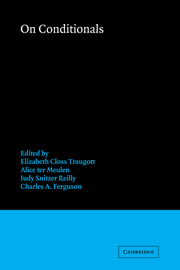Preface
Published online by Cambridge University Press: 04 August 2010
Summary
Conditional (if-then) sentences have long been of central concern in the study of reasoning. Because modern academic practice has compartmentalized three distinct disciplines: linguistics, psychology and philosophy, a tremendous variety of different questions and angles of approach have developed, often independently, and without a common focus. The purposes of this book are: (i) to emphasize the intrinsic connections between the issues that have been addressed within the three disciplines; (ii) to show that all share similar concerns with how human beings use conditional constructions in their language to reason and to communicate their thoughts; and (iii) to point to new directions and potential areas of cross-fertilization for future studies.
The papers are arranged as follows. Part I presents a broad survey of conditionals, the ways in which they are used to reason, and the ways in which they are structured in language (the overview by the editors, and papers by Barwise, Johnson-Laird, and Comrie from the points of view of philosophy, psychology, and linguistics, respectively). Part II presents approaches to particular aspects of conditionals, starting with papers in the tradition of philosophy and formal syntax and semantics that show how the study of conditionals can lead to the refinement of syntactic and semantic theories (Reinhart, ter Meulen, and Veltman). It moves on to papers that focus on the intentions of speakers in using and understanding conditionals from the different perspectives of philosophy, linguistics and psychology (Adams, Van der Auwera, and Fillenbaum).
- Type
- Chapter
- Information
- On Conditionals , pp. ix - xPublisher: Cambridge University PressPrint publication year: 1986

